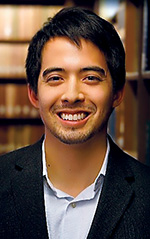The Enduring Value of International Exchange
Reflections
BY ZACH PRZYSTUP
When it comes to international exchange, I’m a bit biased: It wouldn’t be a stretch to say that I owe my very life to it.
Some 50 years ago, my father, James Przystup, met my mother, Ayako Miyazawa, while studying for his Ph.D. at Keio University in Japan. For my grandparents, who raised my dad in a blue-collar Polish neighborhood in Detroit, Japan might as well have been the moon. Indeed, when he informed them of his plans to travel across the world to learn Japanese, my bewildered grandmother asked simply: “What’s wrong with Polish?”
But to the land of the rising sun he went, and the rest is history. Now I eat pierogi, kielbasa, and break oplatek on Christmas Eve; then a few nights later, I eat a traditional Japanese New Year’s meal of gyoza and toshikoshi soba. Existential and culinary benefits aside, we would do well to remember the many benefits of international exchanges as they continue to rebound from a pandemic-induced slump.
First, international exchange provides the essential scaffolding for diplomacy and problem-solving. I first learned this 10 years ago while teaching English in Akitsu, a small fishing village in Hiroshima-ken, Japan. Every morning on my way into work at Toyota High School, I walked by a massive, kanji-engraved stone by the school’s entrance. One day I asked an English teacher what the characters meant. He paused for a moment, then said: “If you are brilliant, hide it.”
As I attempted to imagine an American school with the motto “Hide Your Brilliance,” I had some important realizations about the value of international exchange. On a small scale, I now understood why I couldn’t get my best students to raise their hands and speak, no matter how much I implored them (encouragement, I had discovered, has an inverse relationship to participation in Japanese classrooms).
But the larger lesson was this: If you don’t understand the cultural frameworks in which you operate, many actions and practices simply won’t make sense. What was an important lesson for a 25-year-old assistant language teacher surely goes double for scholars and policymakers wading through history and culture to tackle complex international problems.
Second, my time in the classroom drove home the point that while international exchanges may make you bilingual, they certainly make you bicultural. You will be able to tell your family, friends, and community back home about what really makes your host country tick, and vice versa.
In this way, you can begin to serve as a bridge between cultures. That bridge is always built on personal relationships, and it may be the best antidote to the misinformation and misperceptions that can plague our frenzied discourse.
Third, international exchanges remind us of our shared humanity, simultaneously making the world a bigger and smaller place. Bigger, because you forge real connections to people and places previously unknown. Smaller, because in making these expansive connections, you realize that at their core, people are pretty much the same the world over: we treasure our families and friends, gather to mark life’s milestones, have hobbies, and hold fast to our hopes and dreams.
We like the same things; we just do them in different ways. And exploring the fascinating ways in which we do the same things differently is the very best of international exchange.
Though virtual platforms now supplement many exchange activities, you can’t Zoom these lessons. As Edward Murrow famously noted: “The real crucial link in international exchange is the last three feet, which is bridged by personal contact, one person talking to another.”
Currently, I oversee State’s Fulbright Program in Poland (among other countries). My grandmother would be pleased to see how things have come full circle. That’s the magic of international exchange. When I graduated from college, I didn’t even know Fulbright was an option. I imagine this holds true for many students today.
As international affairs professionals, we can spread the word about Fulbright and other opportunities, encouraging students and young professionals to bridge “the last three feet” and experience the transformative power of international exchange. The world will be a better place for it.
When sharing or linking to FSJ articles online, which we welcome and encourage, please be sure to cite the magazine (The Foreign Service Journal) and the month and year of publication. Please check the permissions page for further details.


